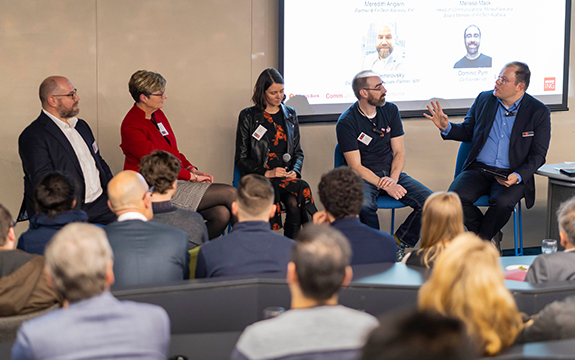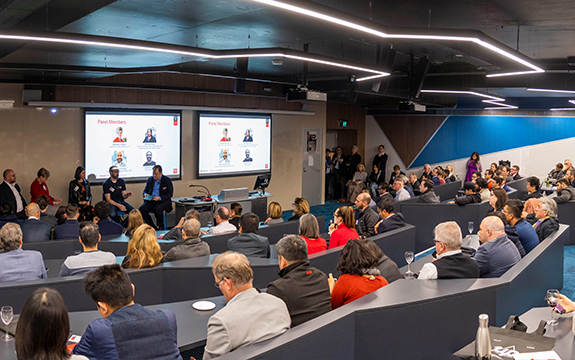Swinburne and Bendigo Bank lead the FinTech revolution

In Summary
- Swinburne and Bendigo Bank have officially launched their partnership and Australia’s first Master of Financial Technologies (FinTech)
- A panel of experts provided insights into the challenges and opportunities of the FinTech revolution
- Course Director Dr Dimitrios Salampasis said talent, skills and people need to be at the heart of FinTech
Swinburne and Bendigo and Adelaide Bank have officially launched a partnership that will see Australia’s first Master of Financial Technologies (FinTech) delivered through the university’s Australian Graduate School of Entrepreneurship (AGSE).
The partnership was launched at an event which included an interactive panel discussion with FinTech experts, moderated by Director of the Master of FinTech, Dr Dimitrios Salampasis.
Titled ‘The FinTech Revolution – a challenge or opportunity?’, the discussion focussed on the rapidly transforming financial services sector and what FinTech companies need to do to remain agile in the ever-evolving industry.
Dr Salampasis said he is delighted that Swinburne is leading the way in FinTech education by addressing the need for a new type of talent at the intersection of finance and technology.
“Talent, skills and people are put at the heart of this evolutionary transformation. This is why we are here – to fill a gap in the FinTech space with our unique postgraduate program.”
Hearing from the industry experts
The panel was made up of FinTech industry experts:
- Dominic Pym, Co-Founder of Up, a next-generation Australian digital bank designed in collaboration with Bendigo Bank
- Meredith Angwin, Partner and FinTech Advisor for global leader in assurance, tax, transaction and advisory services, EY Oceania
- David Nemirovsky, Data and Analytics Associate Partner at information technology giants IBM
- Melissa Mack, Head of Communications at fast-growing personal lender, MoneyPlace, and board member of FinTech Australia

Ms Angwin, said there is a clear increase in the use of FinTech by consumers, backed up by data from EY’s Global FinTech Adoption Index.
“Two years ago, 13 per cent of the population said they had been exposed to a couple of FinTech services, which at that time would have likely been a payment app. Now, 58 per cent of consumers say they have used FinTech services and 96 per cent have heard of it,” said Ms Angwin.
“The challenge this rapid adoption creates is it sets expectations for consumers. Their last best experience with FinTech is now the norm and we’re going to have to continue to meet their expectations.”
Mr Pym agreed with the need to meet customers’ expectations in an increasingly digitalised world where services are accessed at the touch of a screen.
“Fifty per cent of our customers are aged between 16 and 24. They’re used to using AirBnB, Deliveroo, Uber Eats, Google and social networks. Those services are awesome, so why isn’t banking or getting a loan awesome?”
Mr Nemirovsky spoke about the need to shift from being product-centric to customer-centric and the role data plays in this change.
“Personally, I’m happy for companies to have my data if they give me the service I want. There’s a lot of talk about people being scared of sharing their data, but doing so is essentially a payment for the service you’re engaging with.”
Striving for gender diversity in Fintech
Ms Mack spoke about the need for visibility in FinTech in order to achieve gender balance in the industry.
“From the start, the FinTech Australia board has had a minimum requirement for women, which is great because we’ve seen a lot of really strong female leaders come through on the board and I think that’s had a really positive influence on the ecosystem,” she said.
“It definitely is a challenge, particularly in certain roles. For example, it’s more difficult to find women in the tech space. But, like any industry, diversity can be achieved through early education and bringing people through universities into the field.”
Head of University Partnerships at Bendigo Bank, David Tudor, said the advent of this new, hands-on Master of FinTech will equip Swinburne students with practical skills and real-world experiences which they can draw on to accelerate their learning and career development.
“The co-designed and co-delivered course will also help us build on our own knowledge base and internal capability, improve productivity and customer experience, and assist in accelerating our vision to be Australia’s bank of choice,” Mr Tudor said.

